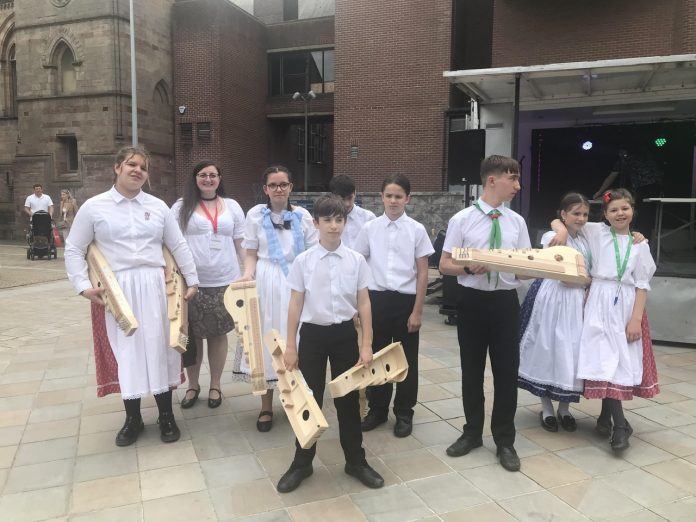What has 44 legs and 352 strings?
The UK’s only community zither ensemble.
Manchester Zither Orchestra is made up of twenty-two young people, aged from just four to 15. Every Saturday, their families travel to the Sharon Youth Centre in Old Trafford from all over Greater Manchester, with some coming from even further afield, including Chester, Preston and Wakefield.
The group has come together to play and improve their skills on the unusual stringed instrument every Saturday afternoon since May 2022, under the tutelage of teacher and cultural leader Gyopar Pavai.
Their repertoire currently consists of seven songs, many of them written centuries ago, and which continue to be shared with Hungarian children.
These include Gólya Gólya Gilice, which dates from as early as the 14th century and is about a stork. Other favourites include Megfogtam egy Szunyogot (I Caught A Mosquito), a traditional folk song written before the 18th century and Láttál-e már Valaha (Have You Ever Seen?)
Pavai, who herself has played the zither since she was a child, believes the Old Trafford group to be the only zither orchestra in the country. Popular in her Hungarian homeland, as well as many parts of Asia, the Middle East and across Eastern and Southern Europe, it is however an instrument little known in the UK.
Essentially a wooden “sound box”, with between one and 50 strings, what distinguishes the zither from other stringed instruments such as the guitar or violin is its lack of a slender ‘neck’. Unusually, it is also played flat on a table, or sometimes on the lap and the strings can be plucked directly with the fingers, or using a plectrum. Its origins can be traced to China or Persia.
The young people in the Manchester Zither Orchestra play instruments of different sizes and pitches, including bass and alto zithers, but all have 16 strings. The zither is known as a citera in Hungarian.
 Although every orchestra member is from a Hungarian cultural background, they have moved to England’s north from a number of neighbouring countries including Romania, Slovakia and Serbia.
Although every orchestra member is from a Hungarian cultural background, they have moved to England’s north from a number of neighbouring countries including Romania, Slovakia and Serbia.
Their repertoire consists of seven songs, including Gólya Gólya Gilice, which dates from as early as the 14th century and is about a stork. Other favourites include Megfogtam egy Szunyogot (I Caught A Mosquito), a traditional folk song written before the 18th century and Láttál-e már Valaha (Have You Ever Seen?)
The orchestra has previously played at Manchester Central Library for International Mother Tongue Day and at Chester Storyhouse for a Hungarian National Day celebration. On Saturday 24 and Sunday 25 June, it will perform at free open air cultural festival Góbéfest in Cathedral Gardens.
The Manchester Zither Orchestra began as part of The Dancehouse project for Hungarian diaspora young people, which also includes folk dance tuition and a Hungarian scouts group. It is delivered by creative youth and community organisation Beat Bazaar, which also launched Góbéfest in 2017.
Gyopar Pavai runs the orchestra, and has two music degrees from the Liszt Ferenc Academy of Music in Budapest as well as a Masters in educational leadership from MMU.
She said: “I am very proud to lead the UK’s only zither orchestra and greatly enjoy teaching and playing alongside this amazing group of young people.
“In Hungary, where I am from, the zither is a popular choice of first instrument for a child, just like the recorder or guitar is in the UK. It is affordable and accessible and gives many children their first taste of making music.
“The zither is really important because it is an instrument shared between many different cultures, from India to China, the Middle East, the Balkans and Scandinavia. Its presence in so many countries shows how linked our seemingly different cultures really are.
“Influenced by Hungarian musical educator Kodaly, I believe that children’s musical education begins nine months before they are born – as soon as they are conceived. You can never start too young exposing children to music and song.
“Learning an instrument like the zither stimulates all the senses and helps young people in every aspect of their development, not just their musicality.”
Márton Lange, aged 13, from Leigh, who has been a member of the orchestra since the start, said: “I really enjoy learning the zither because I learn a lot of new songs that are part of my Hungarian heritage.
“It’s such a cool, unique instrument to play and it’s certainly very unusual in the UK to be a zither player. It is not so well known here. It also feels good to continue in the footsteps of my ancestors, who were also musicians and played several instruments.”
Léna Ördög, aged four, from Salford, said: “I like playing the citera (zither) because I like the sounds that it makes and I can play my favourite song on it, which is called ‘I caught a mosquito’.”
Manchester Zither Orchestra will play at 11.30-12pm on Saturday 24 June and 1.30-2pm on Sunday 24 June at Góbéfest in Cathedral Gardens







